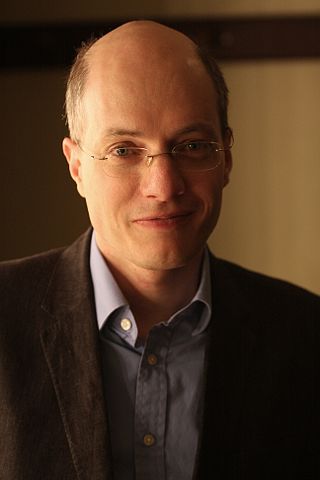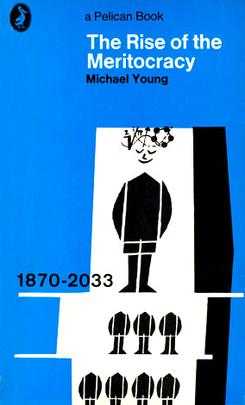Meritocracy is the notion of a political system in which economic goods or political power are vested in individual people based on ability and talent, rather than wealth or social class. Advancement in such a system is based on performance, as measured through examination or demonstrated achievement. Although the concept of meritocracy has existed for centuries, the first known use of the term was by sociologist Alan Fox in the journal Socialist Commentary in 1956. It was then popularized by sociologist Michael Dunlop Young, who used the term in his dystopian political and satirical book The Rise of the Meritocracy in 1958. Today, the term is often utilised to refer to social systems, in which personal advancement and success are primarily attributed to an individual's capabilities and merits.

Public speaking, also called oratory or oration, has traditionally meant speaking in person to a live audience. Today it includes speaking, formally or informally, to an audience through technology – live, pre-recorded, or at a distance.

The Royal Society for the Encouragement of Arts, Manufactures and Commerce (RSA), commonly known as the Royal Society of Arts, is a London-based organisation committed to finding practical solutions to social challenges.
Glossophobia or speech anxiety is the fear of public speaking. The word glossophobia derives from the Greek γλῶσσα glossa (tongue) and φόβος phobos The causes of glossophobia are uncertain but explanations include communibiology and the illusion of transparency. Further explanations range from nervousness produced by a lack of preparation to, one of the most common psychiatric disorders, Social anxiety disorder (SAD).

Hydriotaphia, Urn Burial, or, a Discourse of the Sepulchral Urns lately found in Norfolk is a work by Sir Thomas Browne, published in 1658 as the first part of a two-part work that concludes with The Garden of Cyrus.

Alain de Botton is a Swiss-born British author and philosopher. His books discuss various contemporary subjects and themes, emphasizing philosophy's relevance to everyday life. He published Essays in Love (1993), which went on to sell two million copies. Other bestsellers include How Proust Can Change Your Life (1997), Status Anxiety (2004) and The Architecture of Happiness (2006).
Ergophobia is an abnormal and persistent fear of work or fear of finding or losing employment. It is considered a form of social phobia or performance anxiety, as well as being recognised as a derivative of occupational burnout, derived from a persisting sense of pressure or excessive expectations in a workplace.

Snob is a pejorative term for a person who believes there is a correlation between social status and human worth. Snob also refers to a person who feels superiority over those from lower social classes, education levels, or other social areas. The word snobbery came into use for the first time in England during the 1820s.
Affluenza is a pseudoscientific psychological malaise supposedly affecting wealthy people. It is a portmanteau of affluence and influenza, and is used most commonly by critics of consumerism. It is not a medically recognized disease. The word is thought to have been first used in 1954, but was popularised in 1997 with a PBS documentary of the same name and the subsequent book Affluenza: The All-Consuming Epidemic. These works define affluenza as "a painful, contagious, socially transmitted condition of overload, debt, anxiety, and waste resulting from the dogged pursuit of more". A more informal definition of the term would describe it as "a quasi-illness caused by guilt for one's own socio-economic superiority". The term "affluenza" has also been used to refer to an inability to understand the consequences of one's actions because of financial privilege.
The illusion of transparency is a tendency for people to overestimate the degree to which their personal mental state is known by others. Another manifestation of the illusion of transparency is a tendency for people to overestimate how well they understand others' personal mental states. This cognitive bias is similar to the illusion of asymmetric insight.
The Wee Shu Min elitism controversy occurred in October 2006 in Singapore. Wee Shu Min, daughter of parliament member Wee Siew Kim and a then eighteen-year-old student on Raffles Junior College's Humanities scholarship programme, found herself in controversy after posting on her blog what were viewed by some Singaporeans to be elitist, naïve, and insensitive statements against heartlanders.

Elitism is the belief or notion that individuals who form an elite—a select group of people perceived as having an intrinsic quality, high intellect, wealth, power, notability, special skills, or experience—are more likely to be constructive to society as a whole, and therefore deserve influence or authority greater than that of others. The term elitism may be used to describe a situation in which power is concentrated in the hands of a limited number of people. Beliefs that are in opposition to elitism include egalitarianism, anti-intellectualism, populism, and the political theory of pluralism.
Social anxiety is the anxiety and fear specifically linked to being in social settings. Some categories of disorders associated with social anxiety include anxiety disorders, mood disorders, autism spectrum disorders, eating disorders, and substance use disorders. Individuals with higher levels of social anxiety often avert their gazes, show fewer facial expressions, and show difficulty with initiating and maintaining a conversation. Social anxiety commonly manifests itself in the teenage years and can be persistent throughout life; however, people who experience problems in their daily functioning for an extended period of time can develop social anxiety disorder. Trait social anxiety, the stable tendency to experience this anxiety, can be distinguished from state anxiety, the momentary response to a particular social stimulus. Half of the individuals with any social fears meet the criteria for social anxiety disorder. Age, culture, and gender impact the severity of this disorder. The function of social anxiety is to increase arousal and attention to social interactions, inhibit unwanted social behavior, and motivate preparation for future social situations.

Achievement Ideology is the belief that one reaches a socially perceived definition of success through hard work and education. In this view, factors such as gender, race/ethnicity, economic background, social networks, or neighborhoods/geography are secondary to hard work and education or are altogether irrelevant in the pursuit of success.

The School of Life is a social media company that offers advice on life issues. It was founded in 2008 and has its headquarters in London and branches in Amsterdam, Berlin, Istanbul, Paris, São Paulo, and Taipei. The company offers a variety of educational content and services covering finding fulfilling work, mastering relationships, achieving calm, understanding and changing the world. The company also offers psychotherapy and bibliotherapy services and runs online and physical shops. The company has a channel on YouTube, with over 7 million subscribers; it publishes one new video per week.

People may face feelings of insignificance due to a number of causes, including having low self-esteem, being depressed, living in a huge, impersonal city, comparing themselves to wealthy celebrity success stories, working in a huge bureaucracy, or being in awe of a natural wonder.

Fear of missing out (FOMO) is the feeling of apprehension that one is either not in the know about or missing out on information, events, experiences, or life decisions that could make one's life better. FOMO is also associated with a fear of regret, which may lead to concerns that one might miss an opportunity for social interaction, a novel experience, a memorable event, or a profitable investment. It is characterized by a desire to stay continually connected with what others are doing, and can be described as the fear that deciding not to participate is the wrong choice. FOMO could result from not knowing about a conversation, missing a TV show, not attending a wedding or party, or hearing that others have discovered a new restaurant. FOMO in recent years has been attributed to a number of negative psychological and behavioral symptoms.

Religion for Atheists: A non-believer's guide to the uses of religion is a book by Alain de Botton published in 2012. It argues that while supernatural claims made by religion are false, some aspects of religion are still useful and can be applied in secular life and society. Religion for Atheists was published in the UK in hardback edition by Hamish Hamilton, and in the US by Pantheon. Religion for Atheists was a New York Times non-fiction bestseller, and has been widely reviewed, with mixed results.

The Rise of the Meritocracy is a book by British sociologist and politician Michael Dunlop Young which was first published in 1958. It describes a dystopian society in a future United Kingdom in which intelligence and merit have become the central tenet of society, replacing previous divisions of social class and creating a society stratified between a merited power-holding elite and a disenfranchised underclass of the less merited. The essay satirised the Tripartite System of education that was being practised at the time. The book was rejected by the Fabian Society and then by 11 publishers before being accepted by Thames and Hudson.
Myth of meritocracy is a phrase arguing that meritocracy, or achieving upward social mobility through one's own merits regardless of one's social position, is not widely attainable in capitalist societies because of inherent contradictions. Meritocracy is argued to be a myth because, despite being promoted as an open and accessible method of achieving upward class mobility under neoliberal or free market capitalism, wealth disparity and limited class mobility remain widespread, regardless of individual work ethic. Some scholars argue that the wealth disparity has even increased because the "myth" of meritocracy has been so effectively promoted and defended by the political and private elite through the media, education, corporate culture, and elsewhere. As described by economist Robert Reich, many Americans still believe in meritocracy despite "the nation drifting ever-farther away from it."












